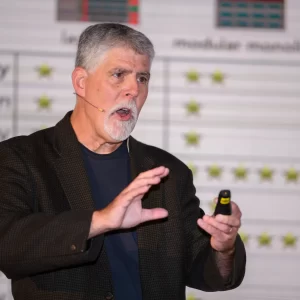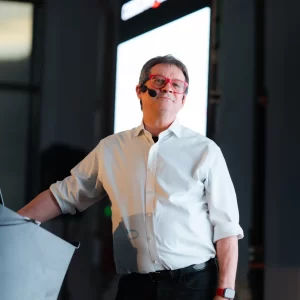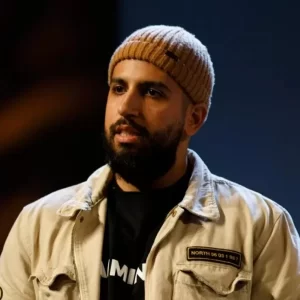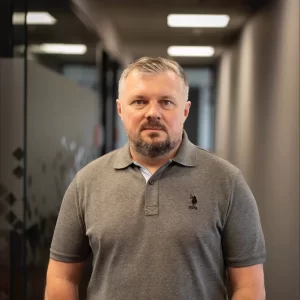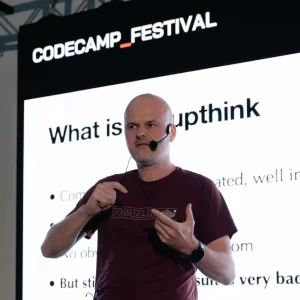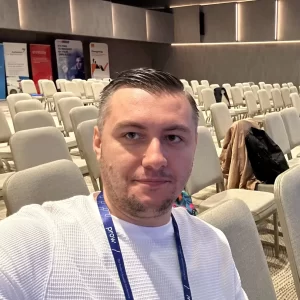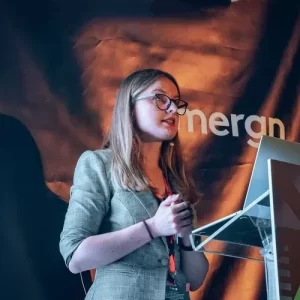The speakers
Join us online for two days dedicated to DevOps and have all your questions answered by some of the world’s top experts and thought leaders in the field.
Masterclasses


- 20/10/2021
- 14:00 - 15:00
Engineering for Software – How to Amplify Creativity
In most disciplines, “Engineering” means the stuff that works, an application of scientific reasoning to solving practical problems. In Software, depending on your background, it either means something bureaucratic that doesn’t work, or it is just another name for software development.
So what are the ideas that we can use as tools to give real, practical advantage in our work in the way that other disciplines achieve? What ideas should we treat as “the tools of our trade” whatever the technology or problem before us? This presentation explores two “tools” that we can use, Testability & Speed.
- 20/10/2021
- 15:00 - 16:00
No, thanks, I’m full! Adjusting the signal-to-noise ratio on keeping up to date with technologies
Navigating the ever-increasing landscape of tools, frameworks, libraries, and everything in-between. Do you need K8s, IAC, Observability, Tracing, and… what’s that, there’s a new technology called Unobtanium that promises to solve everything for you just released v0.1.0? Ugh.
- 20/10/2021
- 16:00 - 17:00
DevOps at Netflix
Netflix is a global leader in video streaming and has always been known in the valley for its culture document, a seminal work in setting the context about culture.
In this session, I will shed light on how Netflix thinks about DevOps, how our culture permeates our thought on Agile practices, DevOps, and development.
It would be a great way to get a glimpse of how loosely coupled and highly aligned Netflix is, and participants can apply some parts of our culture to their organizations.
- 20/10/2021
- 17:00 - 18:00
Local/Personal Dev Environment – Shift left software delivery approach
Shift Left is a practice intended to find and prevent defects early in the software delivery process. The idea is to move tasks to the left as early in the software lifecycle as possible. This helps in improving the quality and guarantee application security at the earliest stages in the development lifecycle. But my favorite parameter that gets addressed is this –helps in enriching developer’s experience which is very often easily ignored.
- 21/10/2021
- 14:00 - 15:00
Disaster recovery in a serverless environment
In a serverless environment using API Gateway, Lambda, DynamoDB and ECS among others, we developed disaster recovery capabilities and because of the advantages of these technologies we achieved a solution that has a very low cost, no downtime in case of a disaster, and no data loss.
- 21/10/2021
- 15:00 - 16:00
Lead like a DevOps with the Ferguson Formula
The most impressive leader for me is Sir Alex Ferguson. During my technical career I have implemented and followed most of the DevOps principles.
Join me and see how you can put DevOps principles in the Ferguson Formula to run a flexible, mature and highly efficient organization.
- 21/10/2021
- 16:00 - 17:00
All in. Persistent storage on K8s for database-like applications
As modern organisations have rapidly embraced containers in recent years, stateful applications like databases have proven tougher to transition into this brave new world than other workloads. Now, much of container orchestration is done in Kubernetes. But the popularity of the K8s platform doesn’t mean it’s easy to use in all scenarios. Simply put: storage on Kubernetes is a challenge. In this keynote, you will find out more about leveraging storage layer abstraction using opensource and proprietary solutions that solve AZ replication and DR problem for database-like applications.
- 21/10/2021
- 17:00 - 18:00
DevOps – How to develop with autonomy and not get called out on a weekend
As openliberty.io grew and evolved, so did the needs of its DevOps. This presentation will focus on how and why we arrived at our current DevOps flow, which was adapted over time from lessons learned that hopefully you’ll be able to avoid. In the Dev portion, we’ll cover our code & content structure, how it enables autonomy for multiple teams, and its flow to production. In the Ops portion, we’ll cover how our build and hosting evolved in order to achieve global high availability, and fast load times, for our production site.
- 21/10/2021
- 18:00 - 19:00
Elements for Test Farm Automation
“Elements for Test Farm Automation” will introduce you into what is needed to construct an Automation Farm – hardware and software.
The Automation Farm is, basically, automation testing – in the same way that a tornado is, basically, wind.
If you want to know what is the technological stack of an Automation Farm, please join us.
Powered by

Mambu
Meet Mambu: the only true SaaS banking platform leading the change in the world of banking. Some call us “experts at collaborating globally”, others know us as a close-knit team capable of solving big problems. One thing is for sure, what brings us together is drive, confidence and a collaborative spirit. We are a dedicated team of +500 professionals spanning 6 continents, building the core part of a major shift in the future and evolution of banking. Our leading cloud native solution is the driving force behind our customers as they grow, scale and transform to meet evolving digital demands. Our mission? Make modern financial services accessible to everyone.
Diamond Partners

3Pillar Global
We harness the power of high performing teams to deliver value-generating digital solutions. 3Pillar Global builds breakthrough software products that power digital businesses. We are an innovative product development partner whose solutions drive rapid revenue, market share, and customer growth for industry leaders in Software and SaaS, Media and Publishing, Information Services, and Retail. 3Pillar’s key differentiator is our Product Mindset. Our development teams focus on building for outcomes and all of our team members around the globe are trained on the Product Mindset’s core values – Minimize Time to Value, Solve For Need, and Excel at Change. Our teams apply this mindset to build digital products that are customer-facing and revenue-generating. Our business-minded approach to agile development ensures that we align to client goals from the earliest conceptual stages through market launch and beyond.

Cognizant
Cognizant Romania is one of Eastern Europe’s largest Software Product Engineering delivery networks. We serve global clients in several industries, including Banking & Financial Services, Insurance, Healthcare & Life Sciences, Communication Media & Technology, and Retail & MLEU (manufacturing, logistics, energy & utilities).
Our product thinking mindset defines, builds, and launches new, experience-centered software products that reinvent business.
To learn more about Cognizant Romania and explore career opportunities visit our website (https://www.cognizant.com/ro/en)!

HCLTech
HCLTech is a global technology company, home to more than 223,000 people across 60 countries, delivering industry-leading capabilities centered around digital, engineering, cloud and AI, powered by a broad portfolio of technology services and products. We work with clients across all major verticals, providing industry solutions for Financial Services, Manufacturing, Life Sciences and Healthcare, Technology and Services, Telecom and Media, Retail and CPG, and Public Services. Consolidated revenues as of 12 months ending March 2025 totalled $13.8 billion. To learn how we can supercharge progress for you, visit hcltech.com.

Bosch
Bosch Service Solutions is a leading provider for Business Process Outsourcing. We are solution designers offering complex technical and software services to the Bosch Group and to external customers in the areas of automotive/ mobility, sensor technology and Internet of Things. We design and provide best-in-class services, such as: software-based solutions, AI and automation, project management, customer experience. Join a team with more than 17 years of experience providing exceptional services as our newest AI Consultant, DevOps engineer, software developer or business process modeler.
Work #LikeABosch

EA Romania
Electronic Arts Romania, one of the largest tech companies and video game developers in Romania, brings together talented people from diverse work backgrounds and industries including producers, software engineers, DevOps engineers, designers, project managers, animators, graphic artists, UX experts, QA analysts, and many others, all united by a common passion: bringing the best video games in the world to life!
Platinum Partners

Luxoft
We’ve been present in Romania for more than 10 years and we are one of the main players on the IT&C local market. Our Luxoft employees in Romania are involved in cutting-edge projects for key industries such as automotive, finance and digital enterprise. And we are always looking for brilliant minds to join our team.










